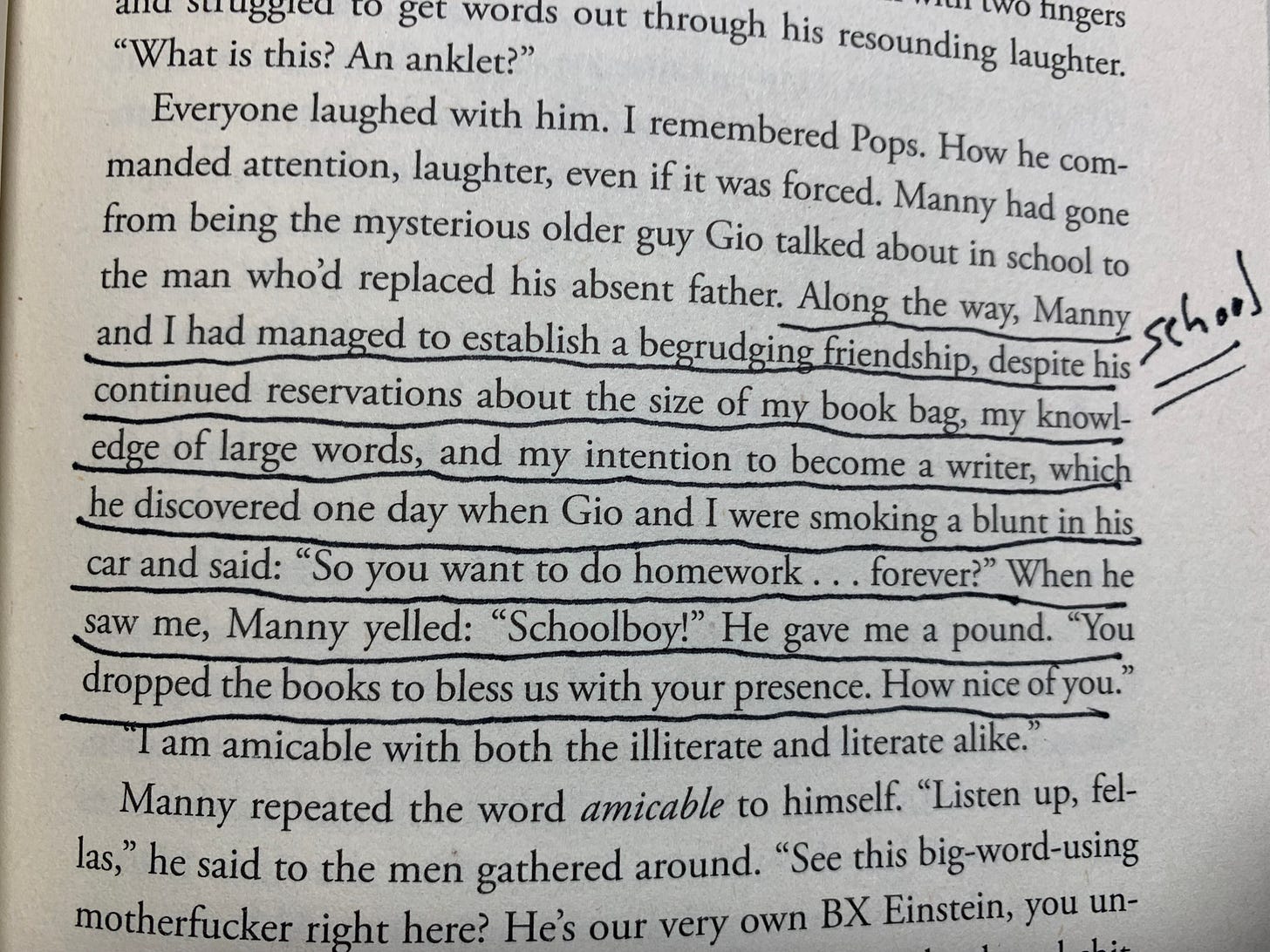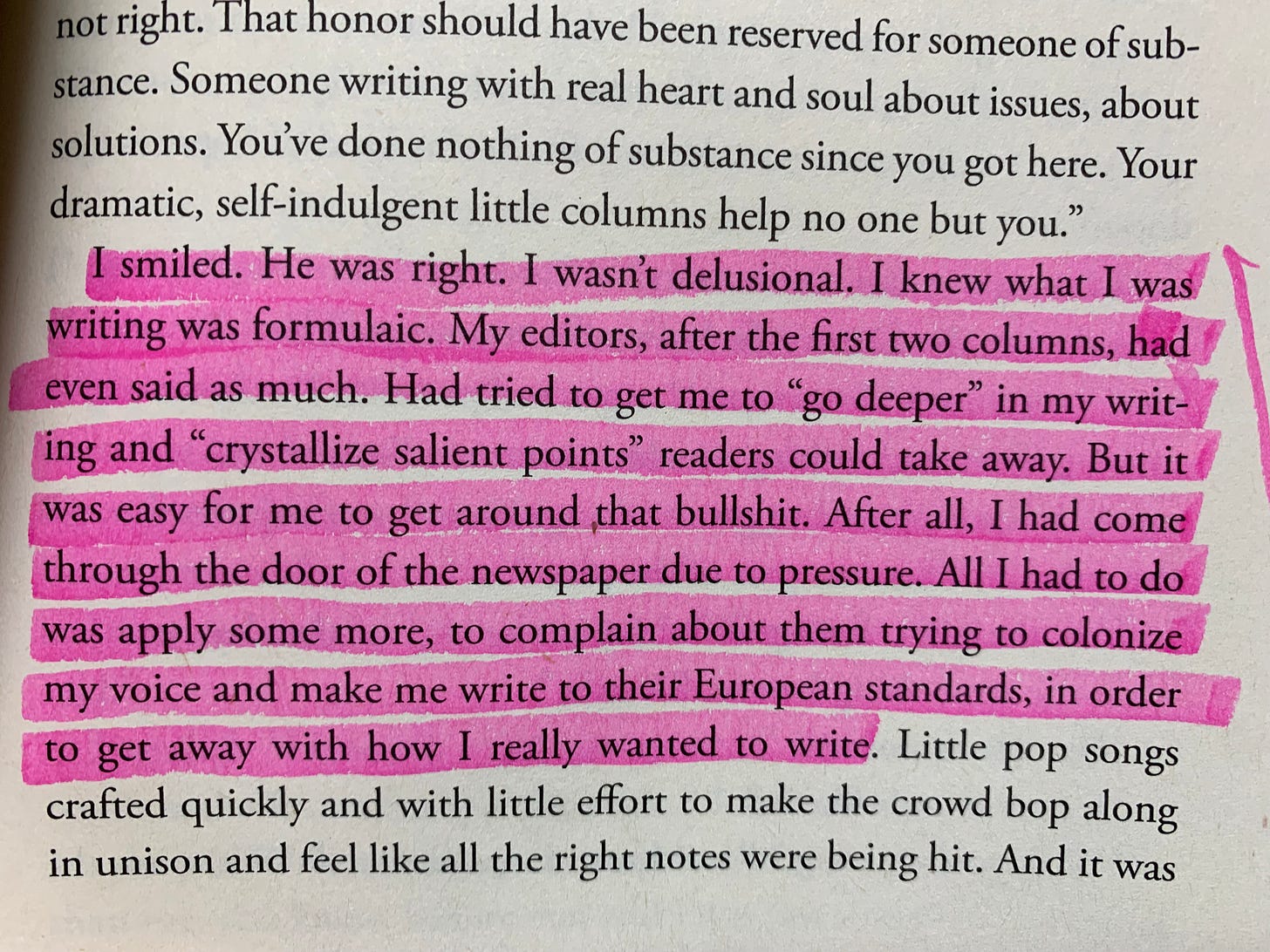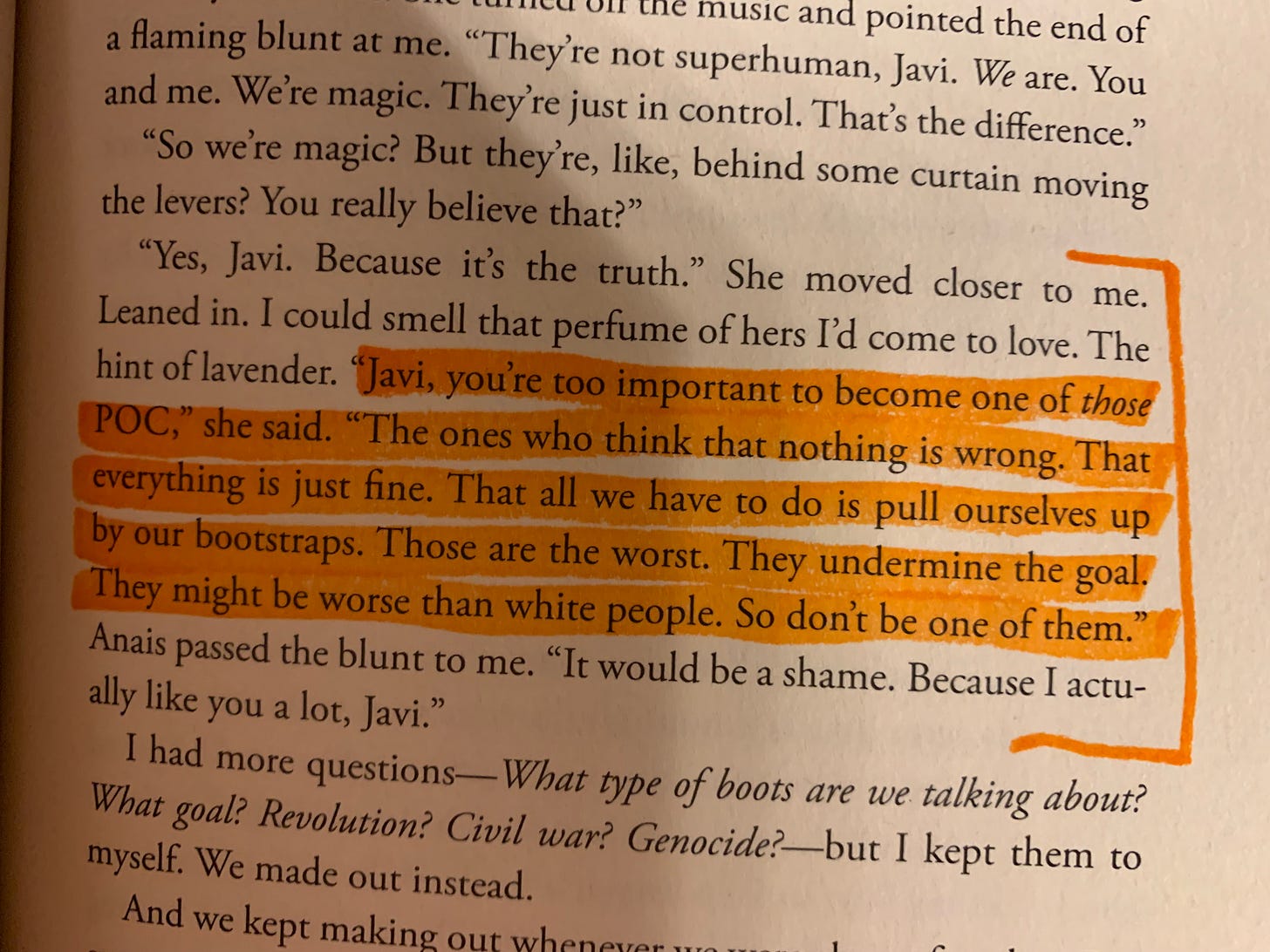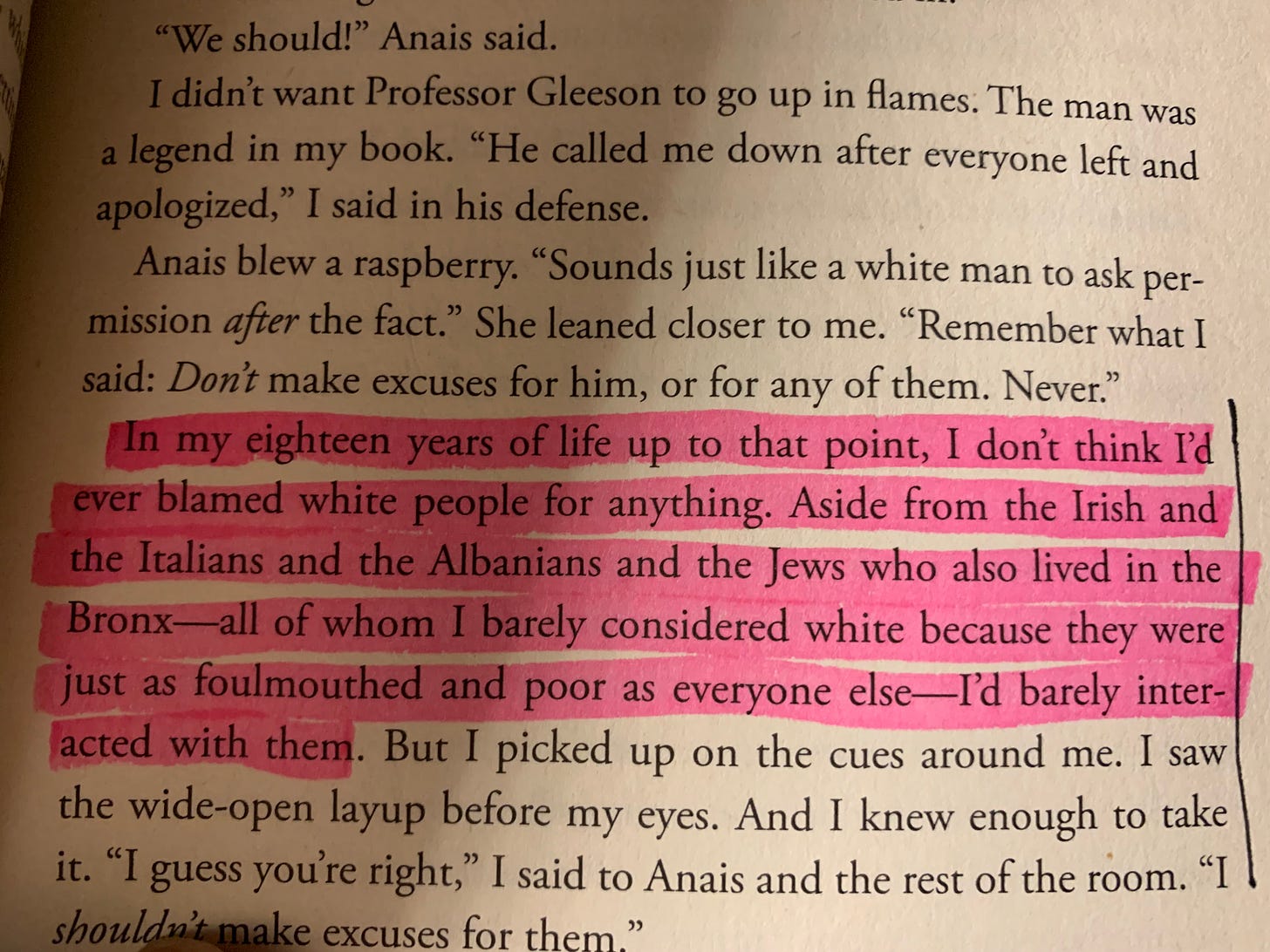*Contains spoiler
*
~Buy Victim HERE
~Buy The Crew HERE
*Look for text interview between myself and
soon!~
Holy sheep shit. Ho. Ly. Sheep. Shit.
Wow this is a damn fine novel.
For the last 8-10 months—however long it’s been—I’ve been hearing about this new novel about identity politics by a new up-and-coming Bronx-born American author who happens to be non-white. (Puerto Rican? I’m actually not certain on this.)
I first heard about Boryga and his novel, Victim, via the wonderful Meghan Daum Substack/podcast, The Unspeakable. Daum asked him a series of interesting questions and I found the guy smart, analytical and intriguing.
I don’t know why it took me so long to finally get to the novel itself, but I finally did. And wow oh Wow.
The novel is a contemporary social satire. Take Percival Everett’s Erasure and Junot Diaz’s This is How You Lose Her and mix in, say, the caustic satirical wit of Mark Twain, and you’re getting there. The novel is 273 pages and the pace is so intense that you move from page to page like a serious drug addict. I gobbled the entire book in under 48 hours (rare for me).
Here’s the plot.
Javier Perez—“Javi”—is a Puerto Rican-American growing up in the Bronx in New York. His father was a big deal drug dealer in PR who was literally shot and killed in front of a 12-year-old Javi. His mother is a good, hardworking single mother raising her only son in the “projects” of the Bronx.
Javi is bookish, intelligent, does well in school and tries to do the right things. His best friend, Gio (short for Giovanni) is his foil: Gio gets in with the wrong crowd, starts dealing drugs, and gets arrested doing a long stretch in prison.
Javi, who has very good grades but a middling SAT score, meets with his white progressive high school counselor who explains to Javi that, because he’s smart and also, well, a minority with brown skin, he could have a real shot at going to a grassy, prestigious university, not just some local city school.
Javi decides to write the college essay that will form the base of his new idea of victimhood, even though in his heart he doesn’t see himself as a victim. He lives in a large apartment, has his own room, always has meals, has a good (if strained) relationship with his mom, and stays out of trouble. Sure, some shit goes down in the streets around him, the drug dealers are always present and violence happens here and there, but he likes his life, likes the Bronx, etc.
But his white counselor convinces him that, actually, he’s being too myopic: When Javi rises above the fray and looks at his life from 30,000 feet, surely he can see that he is actually a victim of “systemic racism,” that “his people” are held down my “the system.” Javi can’t see this. It doesn’t make sense to him. But slowly, he begins to understand that this notion is hot at the moment and that progressive white people run the academies and that his skin color and life circumstances strangely offer him a new sort of power which only certain people with a specific type of Melanin get.
He goes to a fancy, leafy college. He meets a hot half-PR, half-white girl and they date. She’s a serious progressive activist. Internally, he laughs at her ideas, her pretentious, academic, activist jargon, the books she reads, the claims of racism and classism she makes. But, in order to get laid, he does what so many young men in high school and college do: He lies. He pretends to be like her, to care about what she cares about, to be offended by microaggressions and subtle moments of tricked-up possible “racism.”
Thus Javi transforms from an innocent, good kid to a bit of an Identity Monster, a liar who is faking his new morals and values in order to wield a sort of psychological and moral power. After college he and Anais—his PR/white activist girlfriend—move to New York City. She wants to live in a fancy gentrified trendy part of Brooklyn, but he convinces her to move to his hometown in the Bronx. She hates it there, experiencing the casual sexism of Dominican men whistling at her on the street, casual drug-dealing, noise and violence, etc. Anais comes from a wealthy family. Thus begins a subtle tension which grows and becomes searing between Javi and Anais around class, race and gender. (She claims to want to be “authentic” and not “gentrify” even as she hates the authenticity of the Bronx.)
Javi teaches high school kids in the Bronx. He half likes it half hates it. Anais goes to Brooklyn each day to work in activism (or try to). In college, Anais had helped him pressure the school paper to take him on as the “first Latino writer in 100 years of the paper’s existence,” using bullying techniques and threats of exposure and blackmail if they didn’t take him. They did and he rose up fast, becoming a regular contributor. After college, he freelances when not teaching and, through connections, ends up writing at a big magazine covering culture called The Rag. (Which seems to be something like, say, Harper’s or The Atlantic or The New Yorker.)
Eventually—unsurprisingly—the increasing nonverbal tension between the two ultimately breaks their bond and they split up. There’s a moment of reckoning wherein they argue and fight and say to each other what they really think about one another; the anger and bitterness and resentment finally pouring out.
His pieces for The Rag become increasingly absurd. They’re published as nonfiction, first-person memoir pieces on race, culture, ethnicity, identity, but more and more he is exaggerating and even making things up out of whole cloth. But the piece that shoots him up to a whole new level is a brutal—and completely untrue—piece about Anais, wherein he claims that she hated the Bronx and the people in it and was a closet racist and classist and was dragging the cause down.
(By now Javi is a hardcore “activist” using all the typical, cliché jargon like “systemic” and “intersectional” and “structural” etc.) When the piece is published it explodes, along with his burning hot ego. (He is absolutely obsessed with the Twitter-sphere, the likes and follows and messages. The novel is also very much about internet/social media addiction in our time.)
Anais, of course, is deeply hurt, offended and angry. Javi used a fake email and fake number so when The Rag “contacted” her, they were really contacting Javi via the fake email he created. Anais calls and texts telling him she’s shocked and wounded and doesn’t think she deserves this…but he does not respond.
His next essay doesn’t do well so, on this third try, after reuniting with his old best friend Gio after he gets out of prison, he realizes this is what he needs to write about. The “carceral” state, how two boys from the same apartment building in the poverty-stricken Bronx ended up so differently. He meets with Gio—who has changed significantly since being locked up—and tries to convince him about Javi’s inchoate essay, but Gio disappoints him by first questioning Javi’s authenticity, honesty and motives and then by saying repeatedly that he (Gio) in no way sees himself as a victim. He admits he was a dumb kid who made dumb choices and paid the consequences. He changed inside, got his GED and now just wants to get a job and forget the past, move on.
In the end Gio reluctantly gives Javi permission to write whatever he wants to write. It’s his life. With a tense sense of complex dissonance, Javi does write the essay and of course it explodes. It’s filled with blatant fabrications, lies, deceits and bullshit—basically it’s fiction—but he becomes a star. A literary agent calls him wanting to represent him to write a book. The Rag put the piece on its cover. A TV station wants him on live TV. Javi is absolutely marinating in fame, praise and ego. He’s at the top of the world.
He convinces Gio to do the live TV show with him. (They want them both together.) Gio resists but finally acquiesces when Javi offers him two-grand. They go to the TV show. Gio gets angry after a few minutes and storms out. Then the TV show host hits Javi with the truth: Their investigation team has done a deep dive, has contacted the real Anais and others, and they know that Javi is a complete fraud. He makes up his stories whole cloth; he’s an emotional trauma thief using other people’s emotional trauma as fodder for writing that advances his own career. He is, basically, full of shit. A charlatan. A fucking asshole.
Javi goes back and forth with the TV host and then loses control and rips the microphone off and runs off the set. Outside, he steps absentmindedly, suicidally, into traffic and is hit by a car.
In the hospital Gio comes to see him. Gio calls him out. Finally, Javi sees the true error of his ways. He apologizes to Gio and they form the basis of a new bond. His career, of course, is over. He’s fired from The Rag. Everyone hates him online. He’s persona non grata.
Once out of the hospital he gets a basic job doing technical writing for a random company that doesn’t care about his past. It’s boring and easy. He’s changed, realized that ego, social media addiction and a blind drive for power and success are toxic. He regrets the way he used the people around him, especially Anais and Gio.
Eventually, though, he gets a call from the one-time literary agent who’d wanted him to write a book two years prior. The agent explains that he likes Javi, knows he’s smart and talented, and says that, ironically, the cancelled-writer-comes-back-fighting memoir is now becoming hot. If Javi ever wants to write this new memoir, let him know. Javi asks Gio if he should do it and Gio basically says, If you’re doing it for the right reasons and you’re telling the truth: Why not?
Javi does write that book which, of course, is the novel we’re reading itself; Victim.
~
The plot of the novel keeps you absolutely on the very edge of your seat from page one to page 273. It’s sticky and propulsive as hell: You cannot stop reading once you start. It’s just like the addictive nature of social media, fame and glory that Javi tastes in the novel. The climactic scene—when he gets called out by the TV host—happens only 30 or 40 pages from the end. So you’re reading feverishly until that point, and then you have to find out how it gets resolved.
The novel is about identity, of course, and how identity in contemporary times in America shapes people’s thinking, how it can be wielded in some cases like an axe against people. The novel digs into the awkward, tension-filled juxtaposition of the realities of working-class Black and brown people in the inner city, versus the cliches, stereotypes and tropes many white progressives in academia believe about these people. There’s a certain nasty, unintentional and ironic (and satirical) paternalism and condescension which pours from these white saviors to Javi, a young brown kid from the Bronx.
These white folks seem to want—nay, even need—Javi to be a societal victim whose life and the life of those he grew up with were scrupulously and unfairly corralled into the systemic racism trash can of failure. Javi only happened to succeed out of pure, blind luck. Most in his life, they assume, suffer the dreaded fate of Gio, being unfairly and necessarily pushed into a life of drugs and dealing, preyed upon by racist white cops, and thrown into the “carceral state.”
But all along, Javi knows better. He knows the difference between him and Gio is simple: They made different choices. Javi, it’s true, seems organically more intelligent than Gio, but Gio, like so many Black and brown kids from the inner city (in real life), finds school, books, learning and education stupid, pussy-like and white. (Coleman Hughes has written about this, too.) The local drug-dealer who pulls Gio in nicknames Javi Schoolboy. They mock him. They choose drugs and the thug lowlife over school. Fast, easy (but risky) money, status, material things.
In the end both boys learn a similar lesson. Both were faking it. Gio was a good kid who wanted to mimic the rappers and gangsters he praised as a teenager; he made some dumb choices and ended up in a bad situation. Javi, blinded by his own raging ego and need for constant external validation, let go of his basic sense of self-respect and integrity to become someone he was not. In the end they both collided with reality: Gio with prison and Javi with public humiliation and a harsh fall from grace. And the two men rekindle their friendship on a new, genuine basis in the end.
There are so many good scenes and moments in this book; it is pitch-perfect for our radical moment in book publishing and academia right now. The language Javi uses to control his environment is exactly what we see often nowadays on Twitter (X) and other social media spaces. People with agendas using race and gender to take others down by acting superior. (Until we find out they’re frauds, like Jussi Smollet who faked his beating by “Trump” supporters, and Patrisse Cullors, the BLM founder who bought a $6 million dollar home using BLM funds, and many, many more.)
I think in the end the point of the novel isn’t necessarily to mock Woke progressive radical ideology—though certainly that—but to point out the ludicrous chasm between white intention and Black/brown reality. Think of it this way: Most poor people of color living in the inner city are peaceful, law-abiding citizens just trying to survive and get by. Were “systemic racism” a real thing in and of itself, you’d expect close to 100% of these folks to be committing crimes. But that is obviously not the case. In truth, maybe say 10% commit crimes, and it’s usually a small circle of specific young Black/brown men in specific areas doing the crime. And usually the crime is against people of their color and it’s people of color who are calling the cops on them. And, remember, many of these cops are also…Black and brown.
Victim mocks the classic White Savior complex, which we see ravishing culture right now. (For the past decade, really.) White people telling non-white people how victimized they are and giving perks to those who agree (or pretend to) and seek power for these purposes. A majority of Black and brown voters shot down affirmative action. No one really wants to be a victim. People want to be respected and treated as equal citizens. People want to live in a genuine meritocracy where people are judged by their character, their talent, and their ambition.
Does everyone start at the same place in life? Of course not! But that sears across racial boundaries. JD Vance writes about growing up as a poor white in Appalachia. MLK talked about poor whites needing to be lifted up alongside poor Blacks. Tens of millions of white working-class people voted for Trump because they felt rejected by both parties, but especially the Democrats. (Which is also why 20% of Black men left the party for Republicans.)
I am a white man from a wealthy family. Did I start at the same place as some of my white blue-collar friends I grew up near who had no one in their family who’d gone to college? Of course not. And these people themselves didn’t go to college. They did what their fathers did: Became plumbers and mechanics and construction workers and foremen and cops, etc. Working-class. And this is a broader reality, the reality of The West, of American capitalism. It’s inherently unfair. But life is inherently unfair. (You can go all the way back to Adam Smith who wrote about this inherent unfairness in capitalism in The Wealth of Nations.) Everything in any economic system involves complex tradeoffs. There is no utopia (communism, socialism) that makes everyone happy. We’re working with the best thing we’ve got so far.
I’m all for some government assistance when it makes sense for certain communities, individuals, etc. Equality of opportunity is, I think, a great idea in general (yet challenging to pull off). But for the most part, I have a more broadly libertarian perspective: Let people decide their own fates, as much as any of us can. Life is and always has been about choices. Despite whatever pressure there may be in life, you always have the option to make the right choice. Yes, even in tough, violent circumstances. There are endless stories of people making it out of their circumstances. Roland Fryer, from ghetto to Harvard professor and researcher, is one example among many.
The writing in Victim is incredibly strong: Diamond-tight, clear as a cleaned window, deep with metaphor and symbolism. His characters are layered and complex. There is nuance galore in this novel. He doesn’t try to “sound” like a writer; he just writes. The words feel purposeful, polished and appropriate. Boryga clearly spent a lot of time working on this book. It shows.
It reminds me a lot, in many ways, of my own recent published novel, The Crew, which in some ways feels very similar though mine isn’t about race. It is, however, about identity, about finding out who you are and how you fit into this complicated landscape that is being alive. Both books demonstrate a sort of existential rebellion, a crushing ego, a sense of a desire for renown and freedom, and the desire to push past the boundaries to something deeper. While my novel is about a rich white kid who gets into punk rock, booze and literature, both stories are about young egocentric men trying to find their own sense of identity in the world in a way that makes sense to them. They’re about locating meaning in a seemingly meaningless world.
Victim is a must-read. Some of the tightest prose I’ve read in a while. A sparkling, important new literary voice. And exactly at the right time in our chaotic historical moment.










Thanks for the lovely review, Michael. Very glad to see the book resonated with you and I appreciate you sharing that experience with others.
Very interesting looking novel. I'll have to check it out. Kind of goes to show that for all the Woke complaints about "token Blacks," tokenism is actually great if non-White people walk their walk and talk their talk. (After - most importantly - accepting that they are victims, second-class, Ham-descended manifestations of humanity) As has been pointed out already, Wokeism is a racial supremacist movement whose talking points have more in common with traditional White supremacy than anything relevant to conservative America in this day and age. (I have yet to meet a conservative who thinks David Duke is a good guy, or who condoned Charlottesville) Sounds like this book tells those who need to understand this fact everything they need to know.
While it sounds like this author is doing the right thing for reorienting literature back in the direction of truth - much respect for that - it's also tragic that a Puerto Rican has to "dig us out of this," if that makes sense. It's almost like asking someone else to clean up our own mess. But that might well be the only way forward. I know some White authors who have reacted against progressivism in book form; they aren't taken seriously because of how successfully Woke ideology has warped the American mind into accepting its tenets. (In particular "White fragility," which automatically assumes that when White people are upset by anything it's only rich, privileged melodramatic entitlement (i.e. Karens) and shouldn't be taken seriously) We are ghosts, basically. Of course, given what Woke ideologues have done to these non-White groups they also have no choice, literarily speaking, but to make sense of it.
It's kind of like how some of the most effective books countering falsehoods about the Roman Catholic Church are written by Jews who are either 1) disgusted by the prominence of the lies because they are good people who believe in truth, or 2) are indirectly affected by them in other respects. (Like the "Hitler's Pope" myth that demonizes Pope Pius XII, when in fact he saved thousands of Roman Jews from extermination, probably more than any one single individual) These kind Jewish individuals have to speak up for us because the secular world made up its mind at some point that Catholics are evil people who have nothing to say to defend themselves, before gaslighting the rest of the world into adopting something like an anti-Catholic phobia. The effects of Woke ideology are similar - the 2.0 gaslighting phase, if you will - which is why Woke ideology is so damn sinister and even diabolical. It has trivialized, cheapened and neutered millions of voices, including yours and mine; why? Because our melanin is a certain color and that makes us evil oppressors. The psy-op is so powerful that unless we sell our souls to the ideologues, our ability to become influential and respected writers will be handicapped by this for a long time to come sans publishing industry validation; perhaps even for the rest of our lives. Though if Wokeism can be either destroyed or dealt a powerful kick in the face this decade, perhaps younger generations will grow up without the pollution in their minds. (Here you can see why I focus a lot on former Eastern bloc dissidents over at Timeless; they alone have an historical precedent in the literature of the West that applies to our times)
Good to know that there is finally some pushback in literature. I hope a lot of ideologues are pissed off.